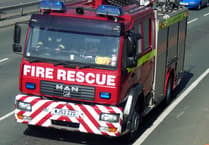I READ with great interest and dismay by Alison Stephenson (April 29), on the new management plan for Whitchurch Down. Statements such as, attracting more wildlife, public access being restricted and disorientation, along with habitat degrading by scrub (what is scrub?) are being used to quantify the need for management. Whose words are these?
The article stated that a bid to save a rare and and endangered habitat was to be made. Yes, it is rare habitat which includes gorse and scrub, and yes it is endangered, by inappropriate management. It was inferred that tackling gorse/scrub will improve the flora and fauna of the site.
To think that gorse/scrub removal on this substrate will enhance anything but stock grazing (this too is questionable) is foolhardy. The habitat covering the Down has evolved over many years and probably contains many species that will not survive if mass-scale gorse removal happens. Species such as fritillary butterflies, nesting birds like linnet, stonechat and perhaps Dartford warbler; mammals such as greater and lesser horseshoe bats, lichens, mosses, fungi and a whole range of invertebrates.
Even the resultant so called grazing will be un-supportive because of the form of grazing involved at these sites. Thus, at the end of it all, habitat and species are lost with no long term gain.
Gorse takes about 15 years to attain a girth of 25 millimetres, once lost will be gone forever, or until someone comes to their senses. There is already far too much raping of the countryside, without considering other factors.
I only wish to see a full and unbiased ecological survey done on the Down before any management is done. The survey period should cover at least two full years to reliably assess what will be destroyed or enhanced by the methods advocated.
Let the council take sole lead as land owners on behalf of us all to make decisions about the future of the area on robust ecological knowledge. If there is money available to destroy, find money to protect them as well. If not, leave well alone. Otherwise, all that will remain will be yet another stock grazing area, with very little wildlife value.
John J Kaczanow
Great Fellinfiled
Mary Tavy



